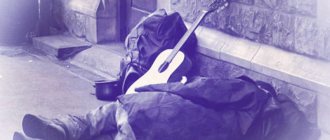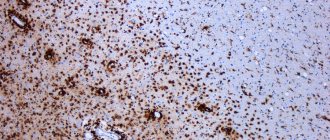Asocial (antisocial) behavior is a mental disorder that occurs at different ages. It is characterized by obvious or hidden hostility, aggression that manifests itself towards other members of society, and disregard for moral norms. Sometimes asociality takes the form of a minor violation of the rules established in society, in other cases it can seriously harm others. Individuals prone to antisocial behavior may lead an isolated lifestyle or unite with other individuals who have a similar worldview.
Causes of antisocial behavior with examples
An antisocial personality does not become such just like that; this is preceded by a number of different reasons.
| Social reasons. | Medical reasons. | Pedagogical reasons. |
| Parents or a partner showed antisociality, tried to assert themselves or achieve their own at the expense of the person. | Deviations in the psychosomatic sphere (diseases caused by a negative emotional state). | Parents and other relatives made excessive demands on the child that were not appropriate for his age. |
| The person was in a situation of social or material inequality. | Infantile behavior. | The baby grew up in an atmosphere of excessive love and was never denied anything. |
| The cause of antisocial behavior was subcultures, religious sects, and other public organizations. | Development of hyperactivity and attention deficit disorder in childhood. | The child did not have a positive role model or support. |
| Living in a dysfunctional family. | Violation of the intrauterine development of the child, the presence of infections. | The child was often punished, it was done unfairly and undeservedly, and physical force was used. |
| Severe experiences of physical, sexual or emotional abuse. | Diagnosed with schizotypal personality disorder, schizophrenia. | Parents ignored the child's needs. |
| Bullying (bullying, evil ridicule, persecution). | Trauma or infection of the brain. | The baby was not taken care of enough or, conversely, was overprotected. |
| Impaired communication with peers and classmates. | The family did not have an atmosphere of love, trust, or warmth. | |
| The presence of dependencies with the further formation of deviant (deviant) behavior. | The child did not have an aesthetic education; adults did not instill a sense of beauty. |
Pandemic as a cause of antisociality, see the video below.
Reasons for asociality
In psychology, there are several factors that can be recognized as sources of antisocial behavior. They are divided into 3 categories:
1. Social factors
- violence in physical and verbal form. A child or teenager can become victims of violence at home, or suffer from their peers. In some cases, the reasons for antisocial behavior include an unhealthy family environment and the existence of strict restrictions set by parents.
In these cases, the following model of asociality arises: deviant behavior acts as a certain defense against external aggression and is the only source of opposition to the rules and stereotypes that must be observed. Besides. Deviations in behavior can occur in a person who is a member of a cult, has lost his material wealth, or is jealous of someone else’s well-being.
2. Pedagogical factors,
namely, improper upbringing, which significantly increases the chance of developing deviations. The desire for antisocial behavior is shown by individuals who grew up in authoritarian families who prefer to severely punish the child and suppress his individuality in childhood. There is another extreme that can cause a problem - strong indulgence of the child’s whims, helping in the formation of selfishness in him, the desire to achieve his own at any cost.
The greatest risk is experienced by children who were not cared for by their parents at all, or who suffered from overprotection. Children of the first category try to attract attention to themselves, often without observing social prohibitions. Children of the second category feel inferior, unable to independently solve their problems. For their self-affirmation, they can carry out illegal acts.
3. Medical reasons,
for example, brain damage, serious mental illness. People who have been given these diagnoses do not always understand what actions they are committing and, sometimes, cannot realize that their behavior does not correspond to the norms established in society. Physical disabilities can be cited as a stimulus for asociality. A person who is characterized by certain physical defects may experience a normal mental state, but is afraid that he may be rejected or laughed at. As a result, he may begin to behave aggressively towards other people and not enter into contact with them.
Manifestations of asociality at different ages
The appearance of antisocial personality traits can be observed at different ages.
Children
Children with antisocial tendencies are immediately noticeable in a group. They are practically not interested in educational activities, games, clubs, and assignments. Such children display aggressive and sadistic tendencies and may be caught stealing toys and sweets. They also demonstrate a number of other behavioral traits:
- Inability to find a common language with peers.
- Tendency to conflict behavior.
- Increased hysteria, frequent cases of rudeness.
- Cruelty to animals and other people.
When antisocial children become school students, they are placed on special records as those who are difficult to educate.
Teenagers
If antisocial behavior in childhood was not corrected, then there is a high probability that it will remain with the child for the rest of his life.
In adolescence, antisocial behavior deepens and becomes decisive. Antisocial teenagers are characterized by:
- They often fall into bad company and are burdened by the care of their parents.
- An antisocial lifestyle is perceived as something romantic.
- They consider themselves to be part of youth subcultures and make corresponding friends.
- They commit demonstratively rude, ugly acts, and feel proud about this.
- Prove to others that they demonstrate their exclusivity through antisocial behavior.
- Refuse to do homework and other school assignments.
- They do not recognize the authority of teachers, parents, and other adults.
- They engage in promiscuous sexual intercourse.
- They leave home and engage in vagrancy.
Adults
In adulthood, children's and adolescents' antisocial habits only take root. They can get worse due to bad habits. Adult antisocial behavior is characterized by:
- Lack of stable income.
- Disrespect for other people.
- Lack of permanent residence.
- Committing immoral acts.
Often, so-called unrecognized geniuses who stand out from the crowd with their provocative views, ideas, and creations are considered asocial people.
Prevention of antisociality
It is necessary to treat behavioral deviations when they begin to manifest themselves under the influence of physical and mental illnesses. In other cases, the main method for correcting antisocial behavior will be prevention . It is recommended to carry it out from childhood. The basis for preventive measures is proper upbringing, a worthy example set by the child’s parents, full care for his health, allowing him to show his individuality.
Psychologists have prepared specific recommendations to prevent deviant childhood behavior, helping to form an adequate attitude towards oneself and others. The most effective of them are:
- Personal example. Parents who want to raise a worthy member of society must provide an atmosphere of goodwill in their home, demonstrate respect for each other, and care. This will allow the child to form normal self-esteem, a correct behavioral model in the future, perceive the people around him, and establish harmonious relationships in the family.
- Spending time together. The most important time for children is the time they spend with their parents. Various memorable events, such as family holidays, joint recreation in nature, will allow the child to develop such qualities as poise, goodwill, and sociability.
- Confidential communication. The younger family member must be confident that his parents will not judge him and will help him at any time. Fear of punishment leads to the child becoming withdrawn, resourceful, and constantly deceiving. To maintain the child’s trust, it is necessary to solve existing problems in a calm environment.
- Appropriate praise. This type of encouragement is best used in cases where there are good reasons for this. Praise for nothing only stimulates the emergence of selfishness and narcissism. These character traits will only cause adaptation difficulties and problems with maintaining discipline in educational institutions in the future.
- Correction. Having identified negative character traits in a child, his parents should immediately move on to specific actions. It is imperative to analyze the current situation, not raise your voice at the child, tell him why you can’t behave like that, and what might happen.
The most lasting results can be achieved through prevention. Families and children's educational institutions should take part in it. To prevent behavioral disorders and correct existing deviations, teachers implement a program that encourages and encourages a healthy lifestyle, allows them to cultivate spiritual values, and choose the right future profession. The work done often leads to positive results.
How to communicate with such people
Many people do not approve of an antisocial lifestyle, but this does not mean that such people should be treated rudely or disrespectfully. Such behavior will only cause a response wave of aggression. It's worth behaving:
- Do not enter into open disputes, conflicts, or showdowns. It's better to avoid sharp corners.
- Try to behave tactfully and politely, thereby providing a positive role model.
- If a person wants to change or asks for help, then it is worth advising him to see a psychologist, because the problem of asociality can be corrected even as an adult.
- It is most difficult when the antisocial person is a close relative. If you can’t establish contact with him, then the wisest thing to do would be to reduce communication to a minimum.
Antisocial lifestyle
Most of society does approximately the same thing every day: some go to work, some go to school or college, some stay at home and run the household. In a word, everyone plays their role, one way or another useful for the others. However, there are also people who act contrary to generally accepted norms and morals. An antisocial lifestyle is usually understood as destructive, when a person not only separates himself from society, but also opposes himself to it, while behaving accordingly. This is a narrow understanding of the term.
In fact, people leading an antisocial lifestyle do not always belong to disadvantaged sections of society: drug addicts, alcoholics, homeless people, beggars, people without certain occupations, etc. In the classical sense, they just avoid normal interactions with other people as much as possible, or simply incapable of this. In this case, this category could include, for example, introverts or people suffering from mental illness.
Can this behavior be positive?
People with an antisocial personality type are not encouraged in modern society. However, in some religions and religious traditions such behavior may be considered positive.
Asociality is a person’s closeness to God, which he strives for by abandoning ordinary earthly life. Such people are usually called blessed, holy fools.
Asociality is encouraged in Christianity, Catholicism, and Buddhism. It is in the context of closeness to God. These religions teach to help other people and not to turn away from society.
Do you think asociality can serve a person well? Share your opinion in the comments.
An example of asociality among brilliant people in the video. Why are they lonely?
Prevention of antisocial behavior
To prevent a child from developing antisocial behavior, it is necessary to engage in prevention. Psychologists have developed a number of recommendations.
| Recommendation. | How to implement. |
| Give praise when it is appropriate. | Unreasonable praise leads to the development of egoism, permissiveness and difficulties in interacting with the team. You need to praise a child when he really deserves it (helped, did a good deed, coped with something on his own). |
| Build trusting communication. | The child should develop the attitude that his parents will always help him and will never judge him. In order to build trust, problems that arise should be resolved in a calm environment. |
| Correct negative behavior traits. | If parents notice incorrect behavior in a child, then there is no need to yell at him, punish him or do nothing. It is better to calmly explain why such behavior is unacceptable and give several examples. |
| Lead by example. | It is important to maintain a friendly atmosphere, care and mutual respect in the home, otherwise the child will have nowhere to learn this. |
| Spend time together more often. | Children really value family time. This helps them grow sociable, outgoing, and friendly. It’s worth organizing family evenings more often, getting out of town, inventing joint entertainment (role-playing, board games, home master classes and competitions, associative games). |
The human psyche is formed precisely in society, in the circle of communication, from infancy to old age. We cannot turn away from society; development, if not stopped, is greatly slowed down.
What does an antisocial lifestyle mean?
The social way of life familiar to everyone is a certain set of actions that a person performs throughout his life:
- gets an education
- works,
- communicates with friends,
- creates a family,
- raises children.
The opposite lifestyle is behavior that is contrary to social norms. Those who lead such a lifestyle consciously or unconsciously oppose themselves to society and live contrary to established norms and canons.
Often such a way of life is destructive in relation to others and because of this, a negative attitude has formed towards asocial individuals in society. The opinion was formed that those:
- those who do not work provide for themselves through illegal means;
- those who do not communicate with others do so for mental reasons;
- those who do not start a family and raise children do so because of problems with violence on their part.
This is true, but not always. Such manifestations are more often characteristic of misanthropes - those who have developed hatred of others. They also have an asocial lifestyle, but it develops against the background of a different worldview.
The reasons for the opposite of a social way of life often do not depend on the will of a person. Its development can be facilitated by:
- lack of livelihood,
- absence of home,
- problems in relationships with family,
- development of addiction to gambling, alcohol or drugs.
In any of these cases, a person needs support. But due to the negative attitude from society, he does not receive it, becoming more and more immersed in problems without the ability to overcome them.
A person has little chance of returning to normal life; a persistent lifestyle is formed, which increasingly contradicts established norms.
How to get rid of asociality - practice
You can develop your own communication and social skills, you should start right now. You need to do the exercises daily, and write down your feelings, emotions, or even fears in a diary. This is necessary for regularity, increasing motivation and tracking your own success.
- Work on your self-esteem. Often antisocial people are not confident in themselves, so they avoid communication.
- Exercise “Share your smile.” Antisocial people rarely smile, joke, or act relaxed. Don't be afraid to do this. If you smile at people and make them smile back, then your relationships with them will develop better.
- Exercise "Compliment". A compliment will help make a person feel positive. It is important that the compliment emphasizes the person's achievements. This helps to create a good mood for both the person who said the kind words and the recipient.
- “Showing Interest” technique. It is common in society to be interested in others and to sincerely empathize with them. A simple question can start a conversation: “How did you get to work today?” or “How is your cat feeling? Is he feeling better now? It is desirable that interest in the affairs of another person be sincere.
- Give up negative thinking. For example, you shouldn’t despair and blame yourself for not being able to find many friends. It is better to think that everything is still ahead, and the situation can be corrected.
- Exercise “Give me three.” You can fight negative attitudes in an unusual way: for each negative attitude, come up with three positive ones. For example, “Nobody loves me, I’m a completely worthless person.” In contrast, the following would be suitable: “I have good traits and qualities,” “Soon I will have many friends,” and “I make a good impression.”
In your diary, write down what level you are at now and what you want to improve. Then write an action plan of what exercises and activities you will do. Share your plans and successes in the comments. This will help you reinforce the material and motivate other participants.
It is not always possible to work with asociality on your own. If there have been serious traumatic events in a person’s life (domestic violence, living in a dysfunctional family, loss of a loved one), then you should seek help from a psychologist.
Thanks for reading the article. Share in the comments what you think about antisocial personalities? Have you often noticed such traits in yourself or your loved ones?
Repost the article, it will certainly become useful for someone and help you cope with antisociality, love people and life.










